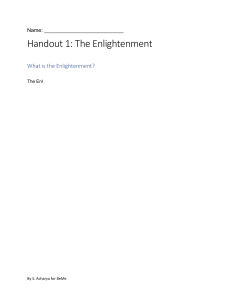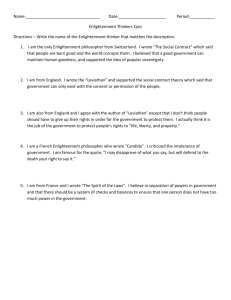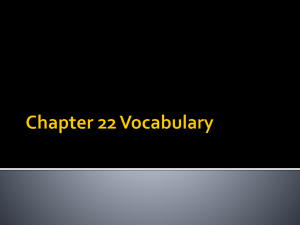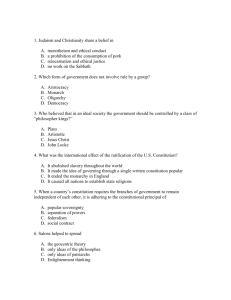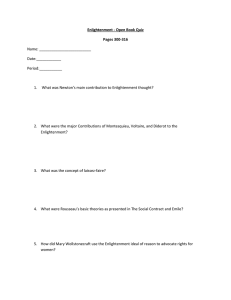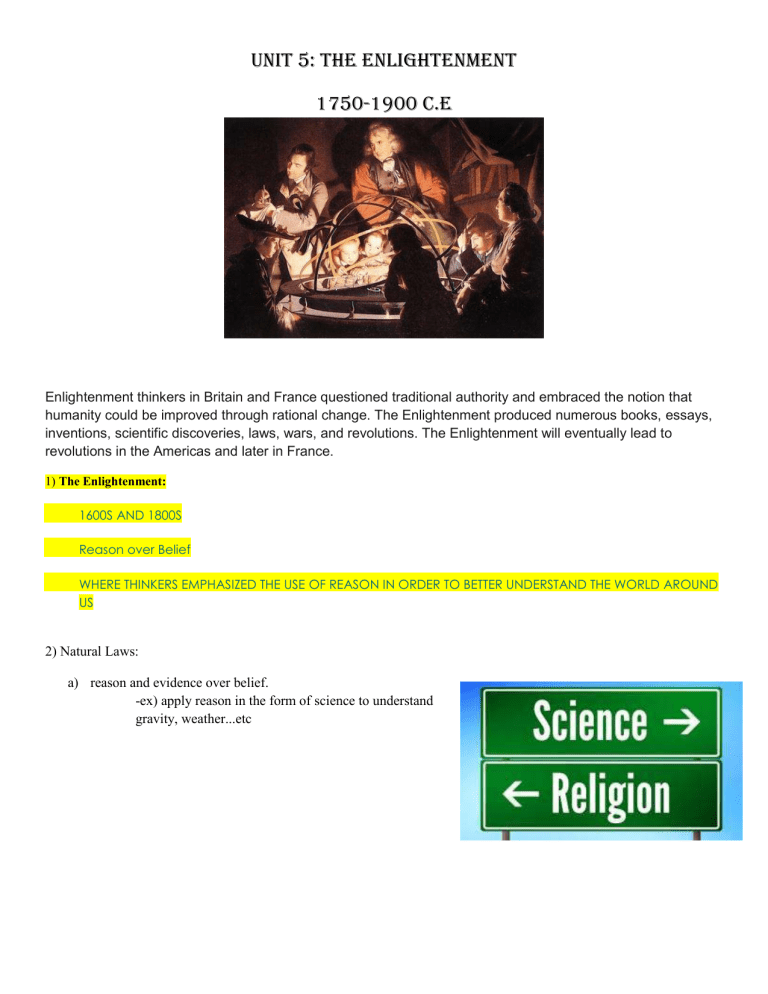
Unit 5: The Enlightenment 1750-1900 c.e Enlightenment thinkers in Britain and France questioned traditional authority and embraced the notion that humanity could be improved through rational change. The Enlightenment produced numerous books, essays, inventions, scientific discoveries, laws, wars, and revolutions. The Enlightenment will eventually lead to revolutions in the Americas and later in France. 1) The Enlightenment: � 1600S AND 1800S � Reason over Belief � WHERE THINKERS EMPHASIZED THE USE OF REASON IN ORDER TO BETTER UNDERSTAND THE WORLD AROUND US 2) Natural Laws: a) reason and evidence over belief. -ex) apply reason in the form of science to understand gravity, weather...etc (Political Spectrum) Examples: 3) Thomas Hobbes:(conservative) � 1600s � WROTE THE BOOK LEVIATHAN � HE ARGUED THAT PEOPLE WERE NATURALLY � � a) GREEDY b) SELFISH c) CRUEL. THEY NEED TO BE CONTROLLED BY A STRONG RULER LIKE an Absolute Monarch. OR People will RESORT to… a) ROB b) KILL c) OPPRESS ONE ANOTHER. 4) John Locke: (liberal) • 1600s • Wrote Two Treatises of Government • He heavily influenced Thomas Jefferson. • People can be REASONABLE and MORAL. • PEOPLE WERE BORN WITH NATURAL RIGHTS THAT COULD NOT BE TAKEN AWAY (unless violation of laws). • RIGHT TO LIFE • LIBERTY • PROPERTY (own/protect) Q) What was The Enlightenment 1600-1750 c.e.? (please provide evidence/examples from your notes) 5) Baron de Montesquieu : ● ● ● ● 1748 French philosopher Wrote The Spirit of the Laws Also, influence Thomas Jefferson and the U.S Constitution ● DIVIDED GOVERNMENT INTO THREE BRANCHES: so no one has too much power= checks and balances. ■ LEGISLATIVE ■ EXECUTIVE. ■ JUDICIAL Notes: (ideas) 6) Adam Smith: • Authored The Wealth of Nations. • He urged the economic policy of laissez fair. a) That government should have a ‘hands off’ the economy b) Let private businesses operate freely c) Free market: between buyers and sellers • No tariffs • Only Free trade • Influence capitalism 7) Voltaire: � � Separation of Church and State. Freedom of thought and expression (speech). ex) free to criticize government and church -“I disagree with what you say, but I will defend to the death your right to say it.” ● � Social Contract: Hobbes: an agreement by which people gave up freedoms to an absolute monarch for... a) � ORDER b) SAFETY Locke and Rousseau: The Declaration of Independence July 4, 1776 We hold these truths to be self-evident, that all men are created equal, that they are endowed by their Creator with certain unalienable Rights, that among these are Life, Liberty and the pursuit of Happiness.--That to secure these rights, Governments are instituted among Men, deriving their just powers from the consent of the governed, --That whenever any Form of Government becomes destructive of these ends, it is the Right of the People to alter or to abolish it, and to institute new Government, laying its foundation on such principles and organizing its powers in such form, as to them shall seem most likely to effect their Safety and Happiness. Prudence, indeed, will dictate that Governments long established should not be changed for light and transient causes; and accordingly all experience hath shewn, that mankind are more disposed to suffer, while evils are sufferable, than to right themselves by abolishing the forms to which they are accustomed. First Amendment First Amendment Annotated Congress shall make no law respecting an establishment of religion, or prohibiting the free exercise thereof; or abridging the freedom of speech, or of the press; or the right of the people peaceably to assemble, and to petition the Government for a redress of grievances. What influences of The Enlightenment do you notice? (name the philosopher and their influence)

